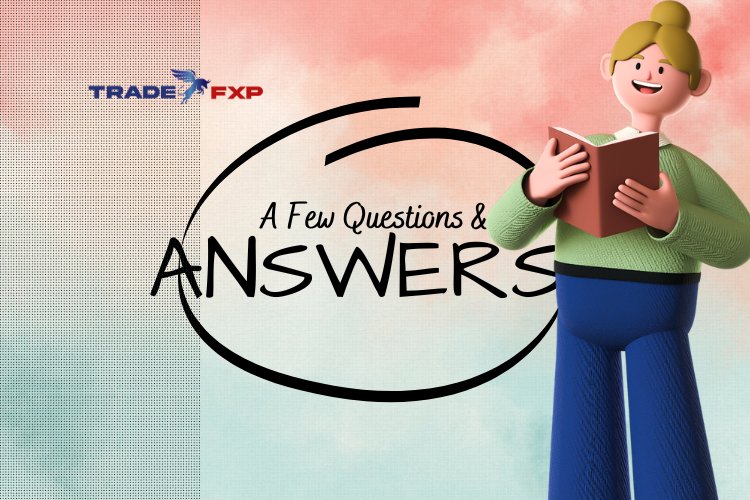A few questions and answers about Forex trading and Investing
Grasp the essentials of Forex trading with our comprehensive Q&A blog. Unravel the complexity of trading and investing in the Forex market.

Who do you think a day trader is?
A: A Day trader is an individual who actively buys and sells stocks, options, futures, and other financial instruments within the same trading day, often multiple times, in an attempt to profit from short-term price fluctuations. Day traders typically use technical analysis and charting to identify trading opportunities and manage risk.
Q: What do you mean by trading?
A: Trading is the process of buying and selling financial instruments such as stocks, options, futures, and currencies to make a profit. Traders use various strategies to identify potential trading opportunities and manage risk.
Q: How does forex trading work?
A: Forex trading is the process of buying and selling currencies to make a profit. Traders use various strategies to identify potential trading opportunities and manage risk. Forex trading is done on the foreign exchange market, which is the largest and most liquid financial market in the world.
Q: When you say Forex Broker, what do you mean?
A: A Forex broker is an individual or firm that acts as an intermediary between traders and the foreign exchange market. They provide access to the market, facilitate trades, and provide advice and guidance to traders.
Q: What is a trading platform?
A: A trading platform is a software application that provides investors and traders with access to financial markets. It allows users to buy and sell securities such as stocks, bonds, options, futures, and currencies. The platform typically provides tools for analyzing the performance of investments, as well as the ability to execute trades and manage accounts.
Q: What is the best time to trade Forex?
A: The best time to trade Forex is when the market is most active, which is usually during the London and New York trading sessions. The London session typically runs from 3:00 AM to 12:00 PM EST, while the New York session runs from 8:00 AM to 5:00 PM EST.
Q: What are the best Forex trading currency pairs?
A: The best currency pairs to trade in Forex are EUR/USD, GBP/USD, USD/JPY, USD/CHF, AUD/USD, and NZD/USD. These pairs are the most liquid and have the tightest spreads, making them the most attractive for traders.
Q: How about trading gold?
A: Gold is a popular asset to trade in Forex, and it can be traded in the form of spot gold or gold futures. Spot gold is a physical asset, while gold futures are a derivative instrument that tracks the price of gold. Both can be traded in the Forex market.
Q: Is investing in gold a good idea?
A: Investing in gold can be a good idea, depending on your financial goals and risk tolerance. Gold is a safe-haven asset that can provide protection against inflation and currency devaluation. It can also be a good diversification tool for a portfolio, as it tends to move independently of stocks and bonds. However, gold can be volatile and is not guaranteed to appreciate, so it is important to consider your financial situation before investing.
Q: How to invest in gold?
A: There are several ways to invest in gold, including buying physical gold, investing in gold-backed ETFs, mutual funds, and stocks, or trading gold futures and options. Each option has its advantages and disadvantages, so it is important to research each option carefully before investing. Additionally, it is important to consider your individual financial goals and risk tolerance when deciding which option is best for you.
Q: What about investing in precious metals?
A: Investing in precious metals, such as silver, platinum, and palladium, can be a good way to diversify a portfolio and protect against inflation and currency devaluation. Like gold, these metals can be volatile and are not guaranteed to appreciate, so it is important to research each option carefully before investing. Additionally, it is important to consider your individual financial goals and risk tolerance when deciding which option is best for you.
Q: How do the elites invest?
A: The elites typically invest in a diversified portfolio of stocks, bonds, mutual funds, real estate, and other assets. They also often use sophisticated strategies such as hedging, options trading, and short selling. Additionally, they may use alternative investments such as private equity, venture capital, and hedge funds.
Q: How to mimic the elite's investing plan?
A: To mimic the elite's investing plan, you should start by creating a diversified portfolio of stocks, bonds, mutual funds, real estate, and other assets. You should also consider using sophisticated strategies such as hedging, options trading, and short selling. Additionally, you may want to consider investing in alternative investments such as private equity, venture capital, and hedge funds. Finally, you should research and understand the risks associated with each type of investment before committing any capital.
Q: How to survive a recession?
A: To survive a recession, it is important to have a well-diversified portfolio of investments that can withstand market volatility. Additionally, it is important to have an emergency fund to cover unexpected expenses. It is also important to maintain a budget and limit spending on essential items. Finally, it is important to stay informed about the economy and the markets to make informed decisions about investments.
Q: What is inside information in investing?
A: Inside information in investing is any non-public information that could give an investor an advantage in the stock market. This could include information about a company's financials, upcoming product launches, or other news that could affect the stock price. It is illegal to use inside information to make investment decisions, as it gives the investor an unfair advantage over other investors.
Q: How to get inside information?
A: It is illegal to obtain inside information to make investment decisions. Any attempts to obtain inside information could result in legal action. The best way to get information about a company is to do research on the company and its industry and to read news and analyst reports.
Q: What are ETFs?
A: Exchange-traded funds (ETFs) are investment funds that are traded on a stock exchange. ETFs are similar to mutual funds in that they are composed of a basket of stocks, bonds, or other securities, but they are traded like stocks. ETFs, offer investors the ability to diversify their portfolios and gain exposure to a variety of asset classes.
Q: What are gold-backed ETFs?
A: Gold-backed ETFs are exchange-traded funds that are backed by physical gold. These ETFs are designed to track the price of gold and provide investors with exposure to the gold market without having to buy and store physical gold. Gold-backed ETFs are a popular way for investors to gain exposure to gold without the hassle of buying and storing physical gold.
If you have any questions regarding making profits in trading or know what is genuine and what is a scam, please feel free to ask us. There are many wolves in sheep's clothing out there. On the top of this page, you have our contact details. Simply ask your question.
Happy trading everyone!
Why do you need to be with TradeFxP? CLICK HERE
To read more interesting articles CLICK HERE
To join our Hunter AutoBot Trading Program CLICK HERE



 admin
admin 










